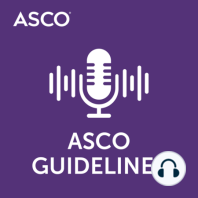15 min listen
Systemic Therapy for Advanced Hepatocellular Carcinoma Guideline
FromASCO Guidelines
ratings:
Length:
10 minutes
Released:
Nov 16, 2020
Format:
Podcast episode
Description
An interview with Dr. John D. Gordan from the University of California, San Francisco, and Dr. Michal G. Rose from Yale Cancer Center and VA Connecticut Healthcare System on "Systemic Therapy for Advanced Hepatocellular Carcinoma: ASCO Guideline." This guideline addresses first-line and subsequent systemic therapy options for patients with unresectable hepatocellular carcinoma that is not amenable to local therapies. Read the full guideline at www.asco.org/gastrointestinal-cancer-guidelines. Transcript ASCO: The purpose of this podcast is to educate and to inform. This is not a substitute for professional medical care and is not intended for use in the diagnosis or treatment of individual conditions. Guests on this podcast express their own opinions, experience, and conclusions. The mention of any product, service, organization, activity, or therapy should not be construed as an ASCO endorsement. BRITTANY HARVEY: Hello, and welcome to the ASCO Guidelines Podcast Series, brought to you by the ASCO Podcast Network. A collection of nine programs covering a range of educational and scientific content, and offering enriching insight into the world of cancer care. You can find all the shows, including this one, at podcast.asco.org My name is Brittany Harvey, and today I'm interviewing Dr. John D. Gordon from the University of California, San Francisco, and Dr. Michal G. Rose from Yale Cancer Center, and VA Connecticut Health Care System, co-chairs on "Systemic Therapy for Advanced Hepatocellular Carcinoma: ASCO Guideline." Thank you for being here Dr. Gordon and Dr. Rose. DR. MICHAL G. ROSE: Thank you. DR. JOHN D. GORDON: Thank you. BRITTANY HARVEY: First, I'd like to note that ASCO takes great care in the development of its guidelines and ensuring that the ASCO conflict of interest policy is followed for each guideline. The full conflict of interest information for this guideline panel is available online with the publication of the guideline in the Journal of Clinical Oncology. Dr. Gordon, do you have any relevant disclosures that are related to this guideline topic? DR. JOHN D. GORDON: I do not. BRITTANY HARVEY: Thank you. And Dr. Rose, do you have any relevant disclosures that are related to this guideline topic? DR. MICHAL G. ROSE: I do not, either. BRITTANY HARVEY: OK, then thank you. Then Dr. Rose, can you first explain the general purpose and the scope of this guideline? DR. MICHAL G. ROSE: Of course. Thank you for this opportunity. As people know, the incidence of liver cancer, hepatocellular carcinoma, is rising rapidly in the United States and worldwide. And although there are multiple local and potentially curable treatments for early stage disease, the medical oncologist does get involved when these fail or if the patient presents with metastatic disease. And over the last three years, or bit more than three years, we've gone from having only one agent for advanced disease, which is sorafenib, to having nine agents approved for either first or subsequent lines of treatment. So this has created a really good problem for medical oncologists, how to choose between these multiple options. So the purpose of our guideline is to help us select the best treatment for the individual patient based on the best current evidence. BRITTANY HARVEY: Great. Then this guideline covers both first line and subsequent systemic therapy options for patients with advanced hepatocellular carcinoma. Dr. Gordon, what are the key recommendations for first line therapy? DR. JOHN D. GORDON: Thanks, and it's also a great pleasure for me to be on this podcast and I appreciate the entire process of putting together this guideline. In the front line setting, a lot of what motivates the completion of this guideline is the approval of the first front line combination for advanced HCC, which is the combination of bevacizumab and atezolizumab. So this was approved based on a report in the New England Journal of Medicine back in May that specific
Released:
Nov 16, 2020
Format:
Podcast episode
Titles in the series (100)
Management of Immune-Related Adverse Events Guideline: An interview with Dr. Bryan Schneider of the University of Michigan on the ASCO clinical practice guideline to increase awareness, outline strategies, and offer guidance on the recommended management of immune-related adverse events in patients... by ASCO Guidelines
